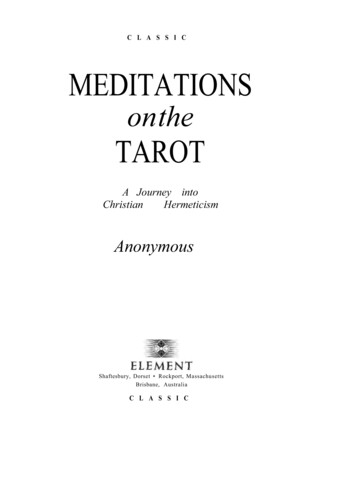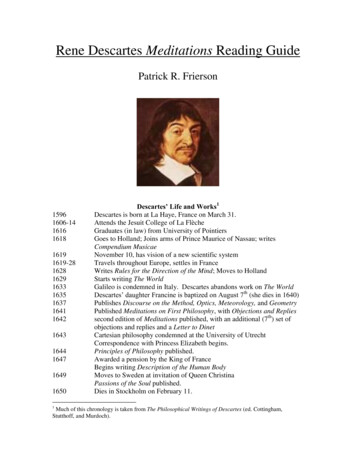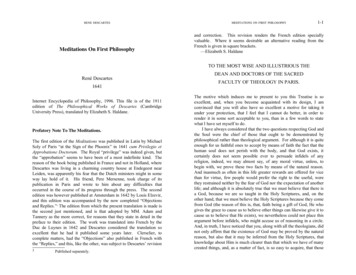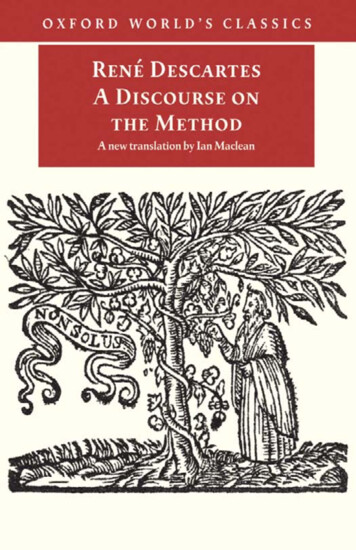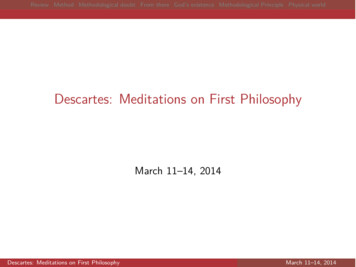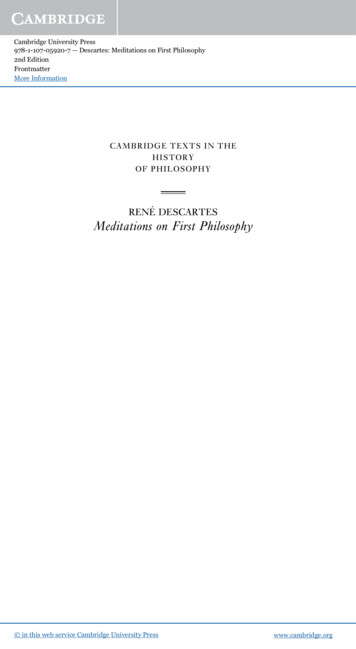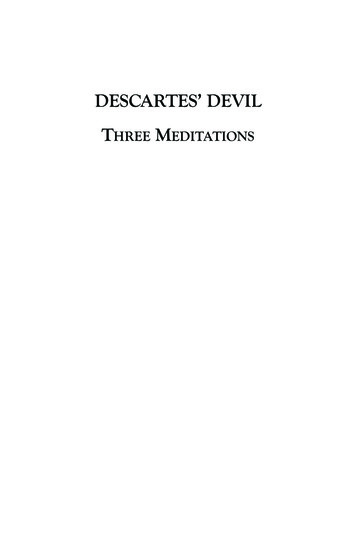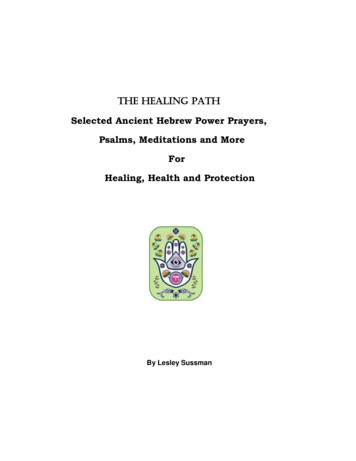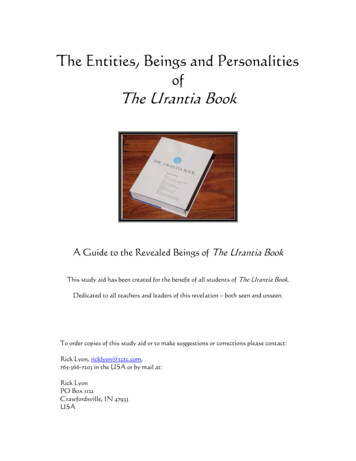
Transcription
Meditations 1 & 2by René Descartes (1641)translated by John Cottingham (1984)FIRST MEDITATIONWhat can be called into doubtSome years ago I was struck by the large number of falsehoods that I had accepted as truein my childhood, and by the highly doubtful nature of the whole edifice that I hadsubsequently based on them. I realized that it was necessary, once in the course of mylife, to demolish everything completely and start again right from the foundations if Iwanted to establish anything at all in the sciences that was stable and likely to last. Butthe task looked an enormous one, and I began to wait until I should reach a matureenough age to ensure that no subsequent time of life would be more suitable for tacklingsuch inquiries. This led me to put the project off for so long that I would now be to blameif by pondering over it any further I wasted the time still left for carrying it out. So todayI have expressly rid my mind of all worries and arranged for myself a clear stretch of freetime. I am here quite alone, and at last I will devote myself sincerely and withoutreservation to the general demolition of my opinions.But to accomplish this, it will not be necessary for me to show that all my opinions arefalse, which is something I could perhaps never manage. Reason now leads me to thinkthat I should hold back my assent from opinions which are not completely certain andindubitable just as carefully as I do from those which are patently false. So, for thepurpose of rejecting all my opinions, it will be enough if I find in each of them at leastsome reason for doubt. And to do this I will not need to run through them all individually,which would be an endless task. Once the foundations of a building are undermined,anything built on them collapses of its own accord; so I will go straight for the basicprinciples on which all my former beliefs rested.Whatever I have up till now accepted as most true I have acquired either from the sensesor through the senses. But from time to time I have found that the senses deceive, and it isprudent never to trust completely those who have deceived us even once.Yet although the senses occasionally deceive us with respect to objects which are verysmall or in the distance, there are many other beliefs about which doubt is quiteimpossible, even though they are derived from the senses—for example, that I am here,sitting by the fire, wearing a winter dressing-gown, holding this piece of paper in myhands, and so on. Again, how could it be denied that these hands or this whole body aremine? Unless perhaps I were to liken myself to madmen, whose brains are so damaged bythe persistent vapors of melancholia that they firmly maintain they are kings when theyare paupers, or say they are dressed in purple when they are naked, or that their heads aremade of earthenware, or that they are pumpkins, or made of glass. But such people areinsane, and I would be thought equally mad if I took anything from them as a model formyself.1
A brilliant piece of reasoning! As if I were not a man who sleeps at night, and regularlyhas all the same experiences1 while asleep as madmen do when awake—indeedsometimes even more improbable ones. How often, asleep at night, am I convinced ofjust such familiar events—that I am here in my dressing-gown, sitting by the fire—whenin fact I am lying undressed in bed! Yet at the moment my eyes are certainly wide awakewhen I look at this piece of paper; I shake my head and it is not asleep; as I stretch outand feel my hand I do so deliberately, and I know what I am doing. All this would nothappen with such distinctness to someone asleep. Indeed! As if I did not remember otheroccasions when I have been tricked by exactly similar thoughts while asleep! As I thinkabout this more carefully, I see plainly that there are never any sure signs by means ofwhich being awake can be distinguished from being asleep. The result is that I begin tofeel dazed, this very feeling only reinforces the notion that I may be asleep.Suppose then that I am dreaming, and that these particulars—that my eyes are open, that Iam moving my head and stretching out my hands—are not true. Perhaps, indeed, I do noteven have such hands or such a body at all. Nonetheless, it must surely be admitted thatthe visions which come in sleep are like paintings, which must have been fashioned in thelikeness of things that are real, and hence that at least these general kinds of things—eyes, head, hands and the body as a whole—are things which are not imaginary but arereal and exist. For even when painters try to create sirens and satyrs with the mostextraordinary bodies, they cannot give them natures which are new in all respects; theysimply jumble up the limbs of different animals. Or if perhaps they manage to think upsomething so new that nothing remotely similar has ever been seen before—somethingwhich is therefore completely fictitious and unreal—at least the colors used in thecomposition must be real. By similar reasoning, although these general kinds of things—eyes, head, hands and so on—could be imaginary, it must at least be admitted that certainother even simpler and more universal things are real. These are as it were the real colorsfrom which we form all the images of things, whether true or false, that occur in ourthought.This class appears to include corporeal nature in general, and its extension; the shape ofextended things; the quantity, or size and number of these things; the place in which theymay exist, the time through which they may endure,2 and so on.So a reasonable conclusion from this might be that physics, astronomy, medicine, and allother disciplines which depend on the study of composite things, are doubtful; whilearithmetic, geometry and other subjects of this kind, which deal only with the simplestand most general things, regardless of whether they really exist in nature or not, containsomething certain and indubitable. For whether I am awake or asleep, two and threeadded together are five, and a square has no more than four sides. It seems impossiblethat such transparent truths should incur any suspicion of being false.And yet firmly rooted in my mind is the long-standing opinion that there is an omnipotentGod who made me the kind of creature that I am. How do I know that he has not brought12‘. and in my dreams regularly represent to myself the same things’ (French version).‘. the place where they are, the time which measures their duration’ (French version).2
it about that there is no earth, no sky, no extended thing, no shape, no size, no place,while at the same time ensuring that all these things appear to me to exist just as they donow? What is more, just as I consider that others sometimes go astray in cases where theythink they have the most perfect knowledge, how do I know that God has not brought itabout that I too go wrong every time I add two and three or count the sides of a square, orin some even simpler matter, if that is imaginable? But perhaps God would not haveallowed me to be deceived in this way, since he is said to be supremely good. But if itwere inconsistent with his goodness to have created me such that I am deceived all thetime, it would seem equally foreign to his goodness to allow me to be deceived evenoccasionally; yet this last assertion cannot be made.3Perhaps there may be some who would prefer to deny the existence of so powerful a Godrather than believe that everything else is uncertain. Let us not argue with them, but grantthem that everything said about God is a fiction. According to their supposition, then, Ihave arrived at my present state by fate or chance or a continuous chain of events, or bysome other means; yet since deception and error seem to be imperfections, the lesspowerful they make my original cause, the more likely it is that I am so imperfect as to bedeceived all the time. I have no answer to these arguments, but am finally compelled toadmit that there is not one of my former beliefs about which a doubt may not properly beraised; and this is not a flippant or ill-considered conclusion, but is based on powerful andwell thought-out reasons. So in the future I must withhold my assent from these formerbeliefs just as carefully as I would from obvious falsehoods, if I want to discover anycertainty.4But it is not enough merely to have noticed this; I must make an effort to remember it.My habitual opinions keep coming back, and, despite my wishes, they capture my belief,which is as it were bound over to them as a result of long occupation and the law ofcustom. I shall never get out of the habit of confidently assenting to these opinions, solong as I suppose them to be what in fact they are, namely highly probable opinions—opinions which, despite the fact that they are in a sense doubtful, as has just been shown,it is still much more reasonable to believe than to deny. In view of this, I think it will be agood plan to turn my will in completely the opposite direction and deceive myself, bypretending for a time that these former opinions are utterly false and imaginary. I shall dothis until the weight of preconceived opinion is counter-balanced and the distortinginfluence of habit no longer prevents my judgment from perceiving things correctly. Inthe meantime, I know that no danger or error will result from my plan, and that I cannotpossibly go too far in my distrustful attitude. This is because the task now in hand doesnot involve action but merely the acquisition of knowledge.I will suppose therefore that not God, who is supremely good and the source of truth, butrather some malicious demon of the utmost power and cunning has employed all hisenergies in order to deceive me. I shall think that the sky, the air, the earth, colors,shapes, sounds and all external things are merely the delusions of dreams which he hasdevised to ensnare my judgment. I shall consider myself as not having hands or eyes, or34‘. yet I cannot doubt that he does allow this’ (French version).‘. in the sciences’ (added in French version).3
flesh, or blood or senses, but as falsely believing that I have all these things. I shallstubbornly and firmly persist in this meditation; and, even if it is not in my power toknow any truth, I shall at least do what is in my power,5 that is, resolutely guard againstassenting to any falsehoods, so that the deceiver, however powerful and cunning he maybe, will be unable to impose on me in the slightest degree. But this is an arduousundertaking, and a kind of laziness brings me back to normal life. I am like a prisonerwho is enjoying an imaginary freedom while asleep; as he begins to suspect that he isasleep, he dreads being woken up, and goes along with the pleasant illusion as long as hecan. In the same way, I happily slide back into my old opinions and dread being shakenout of them, for fear that my peaceful sleep may be followed by hard labor when I wake,and that I shall have to toil not in the light, but amid the inextricable darkness of theproblems I have now raised.SECOND MEDITATIONThe nature of the human mind, and how it is better known than the bodySo serious are the doubts into which I have been thrown as a result of yesterday’smeditation that I can neither put them out of my mind nor see any way of resolving them.It feels as if I have fallen unexpectedly into a deep whirlpool which tumbles me aroundso that I can neither stand on the bottom nor swim up to the top. Nevertheless I will makean effort and once more attempt the same path which I started on yesterday. Anythingwhich admits of the slightest doubt I will set aside just as if I had found it to be whollyfalse; and I will proceed in this way until I recognize something certain, or, if nothingelse, until I at least recognize for certain that there is no certainty. Archimedes used todemand just one firm and immovable point in order to shift the entire earth; so I too canhope for great things if I manage to find just one thing, however slight, that is certain andunshakeable.I will suppose then, that everything I see is spurious. I will believe that my memory tellsme lies, and that none of the things that it reports ever happened. I have no senses. Body,shape, extension, movement and place are chimeras. So what remains true? Perhaps justthe one fact that nothing is certain.Yet apart from everything I have just listed, how do I know that there is not somethingelse which does not allow even the slightest occasion for doubt? Is there not a God, orwhatever I may call him, who puts into me6 the thoughts I am now having? But why do Ithink this, since I myself may perhaps be the author of these thoughts? In that case am notI, at least, something? But I have just said that I have no senses and no body. This is thesticking point: what follows from this? Am I not so bound up with a body and withsenses that I cannot exist without them? But I have convinced myself that there isabsolutely nothing in the world, no sky, no earth, no minds, no bodies. Does it now56‘. nevertheless it is in my power to suspend my judgment’ (French version).‘. puts into my mind’ (French version).4
follow that I too do not exist? No: if I convinced myself of something7 then I certainlyexisted. But there is a deceiver of supreme power and cunning who is deliberately andconstantly deceiving me. In that case I too undoubtedly exist, if he is deceiving me; andlet him deceive me as much as he can, he will never bring it about that I am nothing solong as I think that I am something. So after considering everything very thoroughly, Imust finally conclude that this proposition, I am, I exist, is necessarily true whenever it isput forward by me or conceived in my mind.But I do not yet have a sufficient understanding of what this ‘I’ is, that now necessarilyexists. So I must be on my guard against carelessly taking something else to be this ‘I’,and so making a mistake in the very item of knowledge that I maintain is the most certainand evident of all. I will therefore go back and meditate on what I originally believedmyself to be, before I embarked on this present train of thought. I will then subtractanything capable of being weakened, even minimally, by the arguments now introduced,so that what is left at the end may be exactly and only what is certain and unshakeable.What then did I formerly think I was? A man. But what is a man? Shall I say ‘a rationalanimal’? No; for then I should have to inquire what an animal is, what rationality is, andin this way one question would lead me down the slope to other harder ones, and I do notnow have the time to waste on subtleties of this kind. Instead I propose to concentrate onwhat came into my thoughts spontaneously and quite naturally whenever I used toconsider what I was. Well, the first thought to come to mind was that I had a face, hands,arms and the whole mechanical structure of limbs which can be seen in a corpse, andwhich I called the body. The next thought was that I was nourished, that I moved about,and that I engaged in sense-perception and thinking; and these actions I attributed to thesoul. But as to the nature of this soul, either I did not think about this or else I imagined itto be something tenuous, like a wind or fire or ether, which permeated my more solidparts. As to the body, however, I had no doubts about it, but thought I knew its naturedistinctly. If I had tried to describe the mental conception I had of it, I would haveexpressed it as follows: by a body I understand whatever has a determinable shape and adefinable location and can occupy a space in such a way as to exclude any other body; itcan be perceived by touch, sight, hearing, taste or smell, and can be moved in variousways, not by itself but by whatever else comes into contact with it. For, according to myjudgment, the power of self-movement, like the power of sensation or of thought, wasquite foreign to the nature of a body; indeed, it was a source of wonder to me that certainbodies were found to contain faculties of this kind.But what shall I now say that I am, when I am supposing that there is some supremelypowerful and, if it is permissible to say so, malicious deceiver, who is deliberately tryingto trick me in every way he can? Can I now assert that I possess even the mostinsignificant of all the attributes which I have just said belong to the nature of a body? Iscrutinize them, think about them, go over them again, but nothing suggests itself; it istiresome and pointless to go through the list once more. But what about the attributes Iassigned to the soul? Nutrition or movement? Since now I do not have a body, these aremere fabrications. Sense-perception? This surely does not occur without a body, and7‘. . . or thought anything at all’ (French version).5
besides, when asleep I have appeared to perceive through the senses many things which Iafterwards realized I did not perceive through the senses at all. Thinking? At last I havediscovered it—thought; this alone is inseparable from me. I am, I exist—that is certain.But for how long? For as long as I am thinking. For it could be that were I totally to ceasefrom thinking, I should totally cease to exist. At present I am not admitting anythingexcept what is necessarily true. I am, then, in the strict sense only a thing that thinks;8 thatis, I am a mind, or intelligence, or intellect, or reason—words whose meaning I havebeen ignorant of until now. But for all that I am a thing which is real and which trulyexists. But what kind of a thing? As I have just said—a thinking thing.What else am I? I will use my imagination.9 I am not that structure of limbs which iscalled a human body. I am not even some thin vapor which permeates the limbs—a wind,fire, air, breath, or whatever I depict in my imagination; for these are things which I havesupposed to be nothing. Let this supposition stand;10 for all that I am still something. Andyet may it not perhaps be the case that these very things which I am supposing to benothing, because they are unknown to me, are in reality identical with the ‘I’ of which Iam aware? I do not know, and for the moment I shall not argue the point, since I canmake judgments only about things which are known to me. I know that I exist; thequestion is, what is this ‘I’ that I know? If the ‘I’ is understood strictly as we have beentaking it, then it is quite certain that knowledge of it does not depend on things of whoseexistence I am as yet unaware; so it cannot depend on any of the things which I invent inmy imagination. And this very word ‘invent’ shows me my mistake. It would indeed be acase of fictitious invention if I used my imagination to establish that I was something orother; for imagining is simply contemplating the shape or image of a corporeal thing. Yetnow I know for certain both that I exist and at the same time that all such images and, ingeneral, everything relating to the nature of body, could be mere dreams and chimeras .Once this point has been grasped, to say ‘I will use my imagination to get to know moredistinctly what I am’ would seem to be as silly as saying ‘I am now awake, and see sometruth; but since my vision is not yet clear enough, I will deliberately fall asleep so that mydreams may provide a truer and clearer representation.’ I thus realize that none of thethings that the imagination enables me to grasp is at all relevant to this knowledge ofmyself which I possess, and that the mind must therefore be most carefully diverted fromsuch things11 if it is to perceive its own nature as distinctly as possible.But what then am I? A thing that thinks. What is that? A thing that doubts, understands,affirms, denies, is willing, is unwilling, and also imagines and has sensory perceptions.The word ‘only’ is most naturally taken as going with ‘a thing that thinks’, and this interpretation isfollowed in the French version. When discussing this passage with Gassendi, however, Descartes suggeststhat he meant the ‘only’ to govern ‘in the strict sense’.9‘. . . to see if I am not something more’ (added in French version).10Lat. maneat (‘let it stand’), first edition. The second edition has the indicative manet: ‘The propositionstill stands, viz. that I am nonetheless something.’ The French version reads: ‘without changing thissupposition, I find that I am still certain that I am something’.11‘. from this manner of conceiving things’ (French version).86
This is a considerable list, if everything on it belongs to me. But does it? Is it not one andthe same who is now doubting almost everything, who nonetheless understands somethings, who affirms that this one thing is true, denies everything else, desires to knowmore, is unwilling to be deceived, imagines many things even involuntarily, and is awareof many things which apparently come from the senses? Are not all these things just astrue as the fact that I exist, even if I am asleep all the time, and even if he who created meis doing all he can to deceive me? Which of all these activities is distinct from mythinking? Which of them can be said to be separate from myself? The fact that it is I whoam doubting and understanding and willing is so evident that I see no way of making itany clearer. But it is also the case that the ‘I’ who imagines is the same ‘I’. For even if, asI have supposed, none of the objects of imagination are real, the power of imagination issomething which really exists and is part of my thinking. Lastly, it is also the same ‘I’who has sensory perceptions, or is aware of bodily things as it were through the senses.For example, I am now seeing light, hearing a noise, feeling heat. But I am asleep, so allthis is false. Yet I certainly seem to see, to hear, and to be warmed. This cannot be false;what is called ‘having a sensory perception’ is strictly just this, and in this restricted senseof the term it is simply thinking.From all this I am beginning to have a rather better understanding of what I am. But itstill appears—and I cannot stop thinking this—that the corporeal things of which imagesare formed in my thought, and which the senses investigate, are known with much moredistinctness than this puzzling ‘I’ which cannot be pictured in the imagination. And yet itis surely surprising that I should have a more distinct grasp of things which I realize aredoubtful, unknown and foreign to me, than I have of that which is true and known—myown self. But I see what it is: my mind enjoys wandering off and will not yet submit tobeing restrained within the bounds of truth. Very well then; just this once let us give it acompletely free rein, so that after a while, when it is time to tighten the reins, it may morereadily submit to being curbed.Let us consider the things which people commonly think they understand most distinctlyof all; that is, the bodies which we touch and see. I do not mean bodies in general—forgeneral perceptions are apt to be somewhat more confused—but one particular body. Letus take, for example, this piece of wax. It has just been taken from the honeycomb; it hasnot yet quite lost the taste of the honey; it retains some of the scent of the flowers fromwhich it was gathered; its color, shape and size are plain to see; it is hard, cold and can behandled without difficulty; if you rap it with your knuckle it makes a sound. In short, ithas everything which appears necessary to enable a body to be known as distinctly aspossible. But even as I speak, I put the wax by the fire, and look: the residual taste iseliminated, the smell goes away, the color changes, the shape is lost, the size increases; itbecomes liquid and hot; you can hardly touch it, and if you strike it, it no longer makes asound. But does the same wax remain? It must be admitted that it does; no one denies it,no one thinks otherwise. So what was it in the wax that I understood with suchdistinctness? Evidently none of the features which I arrived at by means of the senses; forwhatever came under taste, smell, sight, touch or hearing has now altered—yet the waxremains.7
Perhaps the answer lies in the thought which now comes to my mind; namely, the waxwas not after all the sweetness of the honey, or the fragrance of the flowers, or thewhiteness, or the shape, or the sound, but was rather a body which presented itself to mein these various forms a little while ago, but which now exhibits different ones. But whatexactly is it that I am now imagining? Let us concentrate, take away everything whichdoes not belong to the wax, and see what is left: merely something extended, flexible andchangeable. But what is meant here by ‘flexible’ and ‘changeable’? Is it what I picture inmy imagination: that this piece of wax is capable of changing from a round shape to asquare shape, or from a square shape to a triangular shape? Not at all; for I can grasp thatthe wax is capable of countless changes of this kind, yet I am unable to run through thisimmeasurable number of changes in my imagination, from which it follows that it is notthe faculty of imagination that gives me my grasp of the wax as flexible and changeable.And what is meant by ‘extended’? Is the extension of the wax also unknown? For itincreases if the wax melts, increases again if it boils, and is greater still if the heat isincreased. I would not be making a correct judgment about the nature of wax unless Ibelieved it capable of being extended in many more different ways than I will everencompass in my imagination. I must therefore admit that the nature of this piece of waxis in no way revealed by my imagination, but is perceived by the mind alone. (I amspeaking of this particular piece of wax; the point is even clearer with regard to wax ingeneral.) But what is this wax which is perceived by the mind alone? 12 It is of course thesame wax which I see, which I touch, which I picture in my imagination, in short thesame wax which I thought it to be from the start. And yet, and here is the point, theperception I have of it13 is a case not of vision or touch or imagination—nor has it everbeen, despite previous appearances—but of purely mental scrutiny; and this can beimperfect and confused, as it was before, or clear and distinct as it is now, depending onhow carefully I concentrate on what the wax consists in.But as I reach this conclusion I am amazed at how weak and prone to error my mind is.For although I am thinking about these matters within myself, silently and withoutspeaking, nonetheless the actual words bring me up short, and I am almost tricked byordinary ways of talking. We say that we see the wax itself, if it is there before us, notthat we judge it to be there from its color or shape; and this might lead me to concludewithout more ado that knowledge of the wax comes from what the eye sees, and not fromthe scrutiny of the mind alone. But then if I look out of the window and see men crossingthe square, as I just happen to have done, I normally say that I see the men themselves,just as I say that I see the wax. Yet do I see any more than hats and coats which couldconceal automatons? I judge that they are men. And so something which I thought I wasseeing with my eyes is in fact grasped solely by the faculty of judgment which is in mymind.However, one who wants to achieve knowledge above the ordinary level should feelashamed at having taken ordinary ways of talking as a basis for doubt. So let us proceed,and consider on which occasion my perception of the nature of the wax was more perfectand evident. Was it when I first looked at it, and believed I knew it by my external1213‘. which can be conceived only by the understanding or the mind’ (French version).‘. or rather the act whereby it is perceived’ (added in French version).8
senses, or at least by what they call the ‘common’ sense—that is, the power ofimagination? Or is my knowledge more perfect now, after a more careful investigation ofthe nature of the wax and of the means by which it is known? Any doubt on this issuewould clearly be foolish; for what distinctness was there in my earlier perception? Wasthere anything in it which an animal could not possess? But when I distinguish the waxfrom its outward forms—take the clothes off, as it were, and consider it naked—thenalthough my judgment may still contain errors, at least my perception now requires ahuman mind.But what am I to say about this mind, or about myself? (So far, remember, I am notadmitting that there is anything else in me except a mind.) What, I ask, is this ‘I’ whichseems to perceive the wax so distinctly? Surely my awareness of my own self is notmerely much truer and more certain than my awareness of the wax, but also much moredistinct and evident. For if I judge that the wax exists from the fact that I see it, clearlythis same fact entails much more evidently that I myself also exist. It is possible that whatI see is not really the wax; it is possible that I do not even have eyes with which to seeanything. But when I see, or think I see (I am not here distinguishing the two), it issimply not possible that I who am now thinking am not something. By the same token, ifI judge that the wax exists from the fact that I touch it, the same result follows, namelythat I exist. If I judge that it exists from the fact that I imagine it, or for any other reason,exactly the same thing follows. And the result that I have grasped in the case of the waxmay be applied to everything else located outside me. Moreover, if my perception of thewax seemed more distinct14 after it was established not just by sight or touch but by manyother considerations, it must be admitted that I now know myself even more distinctly.This is because every consideration whatsoever which contributes to my perception of thewax, or of any other body, cannot but establish even more effectively the nature of myown mind. But besides this, there is so much else in the mind itself which can serve tomake my knowledge of it more distinct
Meditations 1 & 2 by René Descartes (1641) translated by John Cottingham (1984) FIRST MEDITATION What can be called into doubt Some years ago I was struck by the large number of falsehoods that I had accepted as true in my childhood, and by the highly doubtful nature of the whole edifice that I had subsequently based on them.File Size: 229KBPage Count: 9
